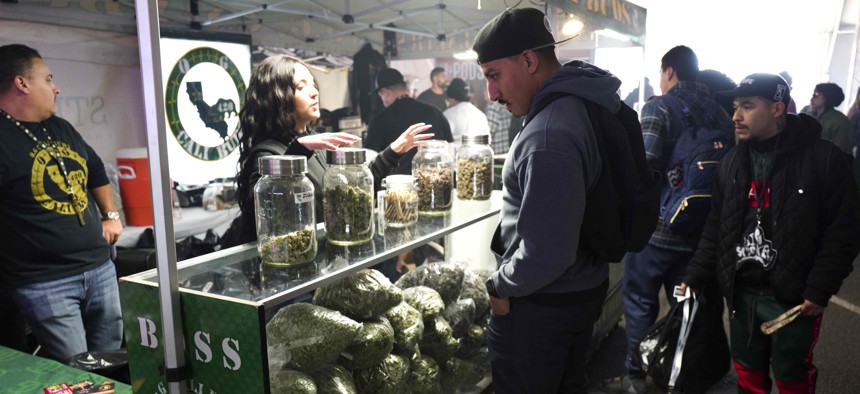Signs of Rising Support From Governors For Legal Pot, As AG Nominee Vows Not to Crack Down

In this Saturday, Dec. 29, 2018 photo a bud tender offers cannabis by Boss Status Genetics from a display filled with large bags of marijuana during Kushstock 6.5 festival in Adelanto Calif. AP Photo/Richard Vogel
An advocacy group notes a “dramatic shift” in elected officials' views on marijuana. U.S. Attorney General nominee William Barr says it's time for Congress to take action on the issue.
Governors around the U.S., especially Democrats, are showing unprecedented levels of support for marijuana legalization, a leading advocacy group on the issue said Wednesday.
That finding, from the National Organization for the Reform of Marijuana Laws, or NORML, comes a day after President Trump’s nominee to be the next U.S. attorney general, William Barr, told lawmakers he is not eager to crack down on state-regulated pot.
“To the extent people are complying with the state laws on distribution and production and so forth, we're not going to go after that,” Barr said Tuesday during a Senate confirmation hearing.
But he also described the current conflict between state marijuana laws and federal policy, which outlaws marijuana, as “untenable” and suggested Congress should take action to resolve it.
Trump’s first Attorney General, Jeff Sessions, who the president fired in November, was known for having harsh views on pot. Early last year, Sessions rescinded Obama-era Justice Department guidelines that states had looked to as they established legalized marijuana programs.
Ten states and the District of Columbia have legalized marijuana for adult recreational use. Michigan became the latest state to do so, with a ballot measure voters approved in November.
The findings from NORML are presented with an annual “Gubernatorial Scorecard” from the group that grades governors based on their comments and actions on marijuana policy.
Nine governors, all Democrats, received “A” grades this year, compared to only two last year. Twenty-seven governors, 22 Democrats and five Republicans, earned a grade of “C” or higher. At the bottom of the rankings were 19 GOP governors who received either a “D” or an “F”.
“There has been a dramatic shift in opinion among elected officials in favor of marijuana policy reform,” NORML’s political director, Justin Strekal, said in a statement.
“Never before have we seen so many governors go on record and pledge their support for legalizing the responsible use of cannabis by adults,” he added.
A number of governors elected last year, according to NORML’s report, voiced support for marijuana legalization as they campaigned, including Ned Lamont of Connecticut, J.B. Pritzker of Illinois, and Tim Walz of Minnesota. All three of those new governors are Democrats.
NORML acknowledges a partisan divide on marijuana. Nearly half of the nation’s 23 Democratic governors are now on the record in support of allowing regulated adult marijuana use, the group says. But it adds that no Republican governors are publicly pushing for this policy.
New York Gov. Andrew Cuomo, a Democrat now beginning his third term, on Tuesday highlighted his support for legalizing marijuana as he outlined his agenda for the upcoming year in his State of the State address. In the past, Cuomo had characterized pot as a “gateway drug.”
New Jersey lawmakers, meanwhile, have been at work on a marijuana legalization measure, a policy that Democratic Gov. Phil Murphy supports. But, as of earlier this week, Democrats in the state Senate were still short of the votes needed to get a bill approved.
Vermont is the only state that has legalized marijuana with legislation so far. Elsewhere, it’s happened with the passage of ballot measures.
But NORML anticipates that, along with New York and New Jersey, lawmakers in Connecticut, Illinois, and Rhode Island could forge ahead with legalization bills in the near future.
Among the guidance that Sessions acted to roll back last January was a document known as the “Cole Memo,” authored in 2013 by former Deputy Attorney General James M. Cole.
The memorandum says if states set up strong marijuana regulatory regimes, in line with certain federal priorities, law enforcement efforts related to the drug will be largely left to state and local authorities.
Some of the priorities included preventing marijuana sales to children, ensuring revenues do not go to criminals and keeping pot from moving across state lines.
With marijuana still illegal under federal law, the document offered a framework of sorts, and a degree of reassurance, for states setting up systems to allow for the legal, regulated use of pot.
Barr in his remarks to the Senate Judiciary Committee on Tuesday said that he would not “go after companies” that have relied on the Cole Memo, noting that investments have been made based on it. “My approach to this would be not to upset settled expectations,” he said.
But the prospective attorney general also indicated that he personally favored keeping pot illegal across the U.S.
“I think it's a mistake to back off on marijuana,” he said.
It's incumbent on Congress, Barr said, to decide whether there should be a central federal law for marijuana, or if regulating it should be left to the states. “If we want states to have their own laws,” he added, “let's get there and let's get there the right way."
Bill Lucia is a Senior Reporter for Route Fifty and is based in Washington, D.C.
NEXT STORY: A Regional Push to Clean Up Cars, Trucks and Mass Transit






